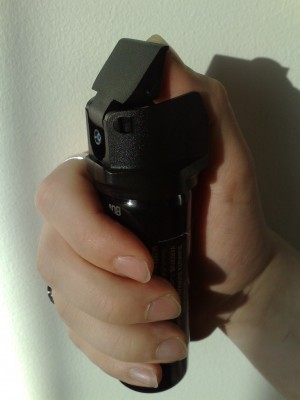This video of UC Davis campus police dousing protesters with pepper spray has close to two million views on YouTube and counting. UC Davis student David Busco was one of the students sprayed that day, saying the pain felt like "thousands of pieces of glass shooting into your eyes."
Busco says the pepper spray was all over his face and mouth, meaning he could not avoid inhaling it, unless he stopped breathing. Concerned students poured bottled water over him, but this only worsened the problem by further spreading the pepper spray around his face and body. Busco says friends soon carried him to the nearest house and, after a quick Google search about pepper spray removal, washed him with dishwasher soap in the shower.
Pepper spray is legal for use in most states by anyone over age eighteen who is not a convicted felon. It is frequently being used during Occupy protests nationwide. We're told it hurts (it look likes it hurts), but what exactly are the health effects? And what's the best way to treat it?
Pepper spray comes from, as you can guess, chemicals derived from peppers, called capsaicin. Deborah Blum writes about the science of pepper spray in her blog Speakeasy Science. She cites a 2004 study, Health Hazards of Pepper Spray, which found that high doses of some of the chemicals in pepper spray can produce respiratory, cardiac and neurologic problems, including death. Blum writes:
Research tells us that pepper spray acts as a potent inflammatory agent. It amplifies allergic sensitivities, it irritates and damages eyes, membranes, bronchial airways, the stomach lining – basically what it touches. It works by causing pain – and, as we know, pain is the body warning us of an injury.
In general, these are short term effects. Pepper spray, for instance, induces a burning sensation in the eyes in part by damaging cells in the outer layer of the cornea. Usually, the body repairs this kind of injury fairly neatly. But with repeated exposures, studies find, there can be permanent damage to the cornea.
The more worrisome effects have to do with inhalation – and by some reports, California university police officers deliberately put [pepper] spray down protestors throats. Capsaicins inflame the airways, causing swelling and restriction. And this means that pepper sprays pose a genuine risk to people with asthma and other respiratory conditions.
David Busco and his friends found that the kind of dishwasher soap they used to remove the pepper spray worked. What a person should not do is use an oil-based soap -- that makes the chemicals stick to the skin even more.
